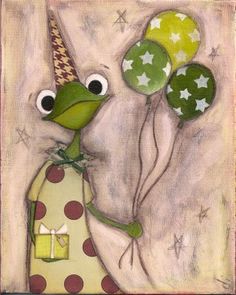Birthday's are more than an opportunity for family and friends to get together and celebrate the fact that you've survived another year. And to eat cake. Although there's no compelling history on why we celebrate birthdays and how the birthday cake came to be, I have found a few historical facts that might interest you.
1. Egyptians started the party. Those Egyptians are behind a lot of what we take for granted in our modern-day world, have you noticed? But I digress....
When pharoahs were crowned in ancient Egypt, they were considered to be transformed into gods. Their coronation date became far more important than their actual birth date. Scholars have pointed out a Biblical reference of a Pharoah's birthday, around 3,000 BCE. This is supposed to be the earliest recorded mention of a birthday. But Egyptologist James Hoffmeier believes that the reference refers to the cornonation date, and not the date of the pharoah's birth, since the coronation is his "birth" as a god.
2. Greeks added candles to the cake. The Greeks offered moon-shaped cakes to Artemis as a form of a tribute to the lunar goddess.To recreate the radiance of the moon's glow, the Greeks lit candles and placed them on the cake. It is believed that the Greeks took the idea of celebrating their pharoahs as gods from the Egyptians, and used it to celebrate their own gods and goddesses.
3. The ancient Roman civilization is believed to be the first to celebrate the birth of the common man...and I do men men only. Early Romans would celebrate birthdays with family and friends, while the governement created holidays to celebrate the births of of their most famous citizens. Those who were lucky enough to live to age 50 received a cake made of wheat flour, olive oil, honey,and grated cheese. Not exactly a double chocolate layer cake but still pretty tasty, I imagine. Women's birthdays were not celebrated until the 12th century.
4. Christians believed birthdays to be a pagan celebration. Since man was considered to be born with "original sin", the Christians Church considered birthday celebrations to be evil for the first few hundred years of their existence. Sometime, around the 4th century, Christians changed their minds about birthdays and began celebrating the birth of Jesus, as the holiday we know as Christmas.
5. Contemporary birthday cakes were invented by German bakers. Although the general idea of celebrating birthdays took off around the world, especially in China where a baby's first birthday was specifically honored, Kinderfeste (which came out of late 18th century in Germany) is the closest thing historians can find to a contemporty birthday party. This celebration was held for German children, or "kinder" and included a birthday cake and candles. Kids got one candle foreach year of life, plus another one for the hope of living at least one more year. Blowing out the candles and making a wish was also part of the celbration.
6. The Industrial Revolution brough cakes to the masses. For a long time, sugary cakes were only available to the very wealthy, as the ingredients need to bake them were considered a luxury. During the Industrial Revolution the cake ingrediants became more abundant, and thus more affordable, and bakeries began offering pre-made cakes at lower prices due to advances in mass production. All this made celebrating birthdays with cakes and candles something that most common people could now enjoy.
7. The Birthday Song. In 1893, Patty and Mildred Hill wrote a song called "Good Morning To All" and was intended to be sung by students before classes began. The song eventually caught on across America and gave rise to a number of variations. Robert Coleman, in 1924, added a few lyrics that would quickly become more popular than the original version. It is also what we now sing as "Happy Birthday To You".
And did you know that Marie Antoinette didn't actuall utter the phrase, :"Let them eat cake!" Supposedly, that line first appeared in a book by Jean-Jacques Rousseau. Yet another historian claims that famous phrase came about 100 years earlier and was said by Marie-Therese, the wife of King Louis XIV. I guess we'll never know the true origins, for certain and it doesn't really matter; for Marie-Antoinette will continued to be associated with that famous saying.
There are any number of good reasons to celebrate your birthday; presents, cake, ice cream, family and friends. But I think the most important reason is simply that it's a day to celebrate the magnificence of YOU and all the gifts you enrich the world with...just by being alive. I hope my friend has a wonderful 69th birthday and has many more to come. I'm excited to be able to share this special day with him.
Have a beautiful, happy, and safe Labor Day Weekend. I'll see all back here on Tuesday.

 RSS Feed
RSS Feed